So, how are you guys? I am here again with a new episode of the Simple Question series. Last year I discussed about basic concepts of Antimatter and Antimatter annihilation and of course about some unsolved mysteries. However, I left some interesting questions unanswered. And this is the post where I will discuss all those questions.
So what do you think why our universe is entirely made of matter? And really is it? Is there any mysterious place where we can find galaxies of antimatter? Does neutral matter (like photons) have an anti-version? Is gravitational force reversed for antimatter? How scientists hold and study antimatter?
Really mind blowing questions, aren't they? And we're going to discuss them in this post, so don't go anywhere.
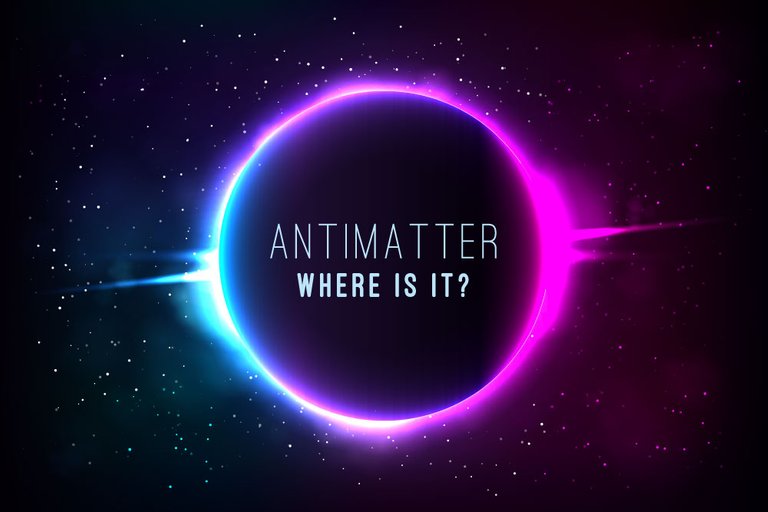
Image Credits : Freepik
Now we know that antiparticles exist and Dirac's formula does a fabulous job in describing their behaviour. But that doesn't mean we fully understand them. De facto, this peculiar phenomenon of the universe generates more questions than answers. For example, why do these antiparticles exist? You may answer that, theory of particles requires them. But does this answer fully explain their existence?
Another question can be, is antimatter exactly opposite of the regular one or are there some minute differences in behaviour, texture, flavour etc? Does it feel gravity the same way as regular mattery objects feel, or does it feel it the opposite way?
Well, the biggest of this question is a simple one: Why is our world made of matter and not antimatter?
If you are positive enough to handle the negativity of the negative matter, read on to learn more about these mysteries. Don't worry it's... free of charge. :p
Why the Universe, not the Anti-Universe?
There is one important difference between matter and antimatter: Matter is everywhere, but antimatter is nowhere to be found, at least not in our observable universe. So it seems that the universe has a lot more matter than antimatter.
As matter and antimatter are opposite versions of each other, then according to physics we would expect that the same number of particles and antiparticles were created during the Big Bang (remember the symmetry in Physics). But, if that had happened then each particle and antiparticle would have annihilated each other when they met and eventually converted all matter in the universe into photons and energy. Since you're alive and reading this article, and you are pretty sure that you are not made out of light, so we can say that this didn't happen. Therefore, it turns out that there might have been some preference for matter over antimatter. But the universe doesn't play dice!
However, there can be two possibilities to explain this inequality:
Possibility - 1
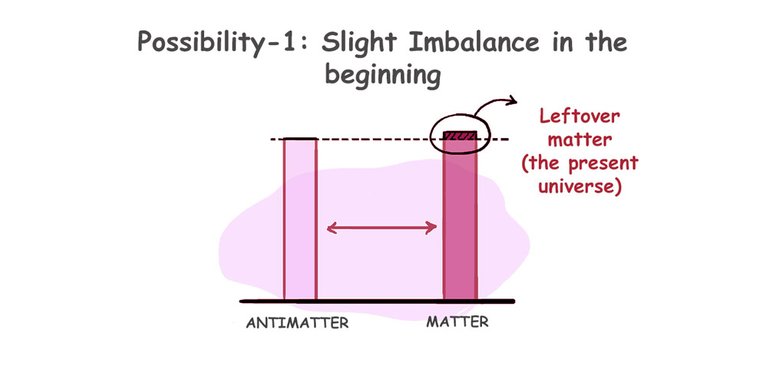
As Albert Einstein said:
"For every one billion particles of antimatter there were one billion and one particles of matter. And when the mutual annihilation was complete, one billionth remained - and that's our present universe."
It suggests that during the Big Bang, slightly more matter was created than antimatter. Again the vast majority of matter and antimatter annihilated itself into oblivion and the tiny bits of matter that were left resulted in the creation of all the galaxies, stars, planets and dark matter that exist today.
The phenomenon that resulted in the inequality in the creation of matter and antimatter is called baryogenesis and the imbalance produced is called baryonic asymmetry.
This possibility does explain the mattery universe we see today, but it has some problems. It does answer the question, "Why is the universe made of matter and not antimatter?”, but again it raises an equivalent question, "Why did the universe begin with more matter than antimatter?". Sadly enough, we don't have an answer to this question. And again our present theories about the beginning of the universe are inconsistent with anything asymmetrical during the initial production of matter and antimatter.
Possibility - 2
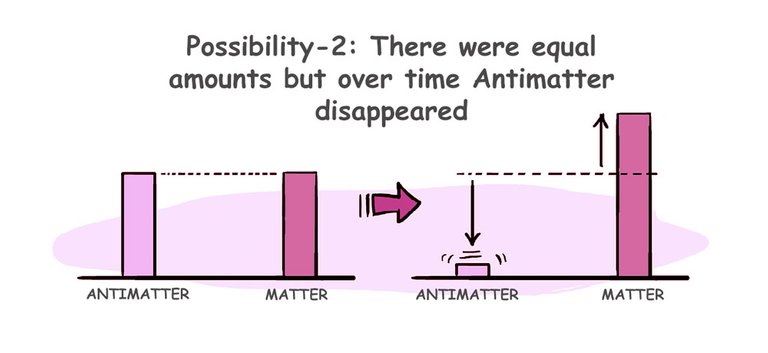
It is possible that equal amounts of matter and antimatter were created during the Big Bang. But there was something in the particles that caused to be more matter than antimatter.
This is possible if there are some physical reactions that destroy antimatter faster or create more matter than antimatter. As particles and antiparticles are created all the time, even a small difference in how they are destroyed or created can add up to a large imbalance.
So, what do you think, Possibility-2 is quite possible, isn't it? But, again how likely the universe has inherent preference for making and preserving matter over antimatter. As I said, most of the Physics is fully symmetric. And as far as we know, what particles can do, antiparticles can reversely do. For example, when a neutron undergoes a nuclear beta decay, it releases a proton, an electron and an antineutrino, and in exact opposite way when an antineutron undergoes a nuclear beta decay, it releases an antiproton, an antielectron and a neutrino.
So there must be something else that can explain the preference for matter over antimatter. But at present we don't know what it is.
Maybe Antimatter is Somewhere Hidden
What if we got it all wrong? Maybe, there are equal amounts of matter and antimatter in the universe, but they are all separated into different regions due to cosmic inflation in the primordial time of the universe. We know that the Earth and its neighborhood are definitely made of matter, but what if other things beyond them are made of antimatter?
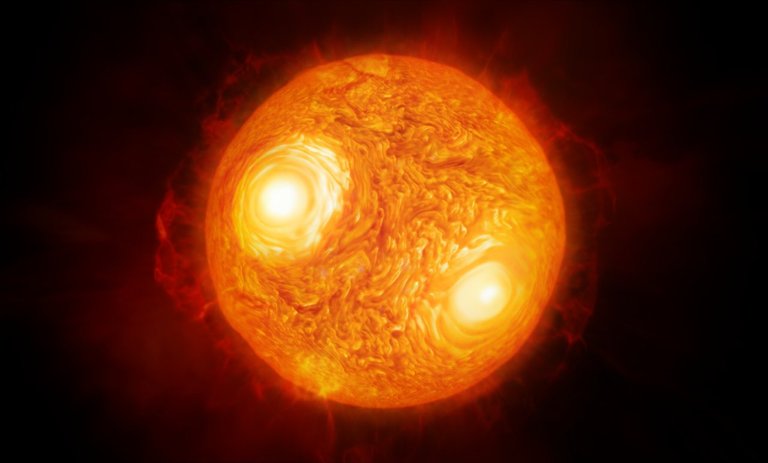
Is it made of Matter or Antimatter? | ESO
Matter and antimatter are so similar that we can't tell if a distant star or galaxy is made of matter or antimatter. An antimatter star would have the same nuclear reactions and generate photons the same way with the same energies and an antimatter galaxy will also have the same chemistry and absorption and emission spectra as a normal matter galaxy. So it becomes near to impossible for physicists to determine if a distant celestial body is made of antimatter just by looking at its physical features. But we are forgetting one thing: when matter comes in contact of antimatter they annihilate with big flashes of light and other electromagnetic waves.
So, let's take a look on Earth and its surroundings i.e. the Moon and neighboring planets. Earth is made of matter and if it had any antimatter on it, it would have reacted explosively. Now let's look at the moon, if moon was made of antimatter, then every time it was hit by a matter meteor there would be a explosion with a giant flash of light. And we know that even an antimatter meteor of size of a raisin could cause an explosion as powerful as an atomic bomb. The Earth and the Moon are constantly bombarded with matter meteors, small and big. So, we can be sure that at least the Earth and the Moon aren't made of antimatter.
Same is the case for Mars and other planets of our solar system. If Mars was made of antimatter, we would see the Mars light up with exploding photons. In fact, if there was any significant concentration of antimatter near a region with matter, you would see constant annihilations and release of photons at the border between the matter and the antimatter region. Do we see such phenomenon in our neighborhood? No. So, we can be pretty sure that our Solar System is not made of antimatter.
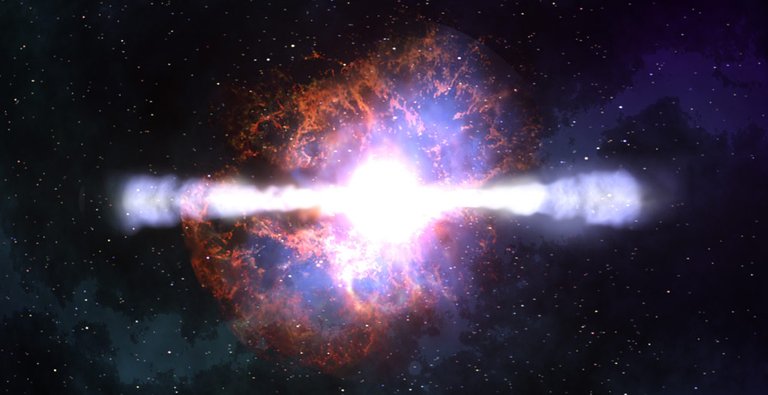
Annihilation in remote space
Astronomers are now searching for entire solar systems made of antimatter in our galaxy, but haven't found any hint of that. They have even considered the possibility of entire galaxies made of antimatter. NASA is also trying to find if such galaxies exist by looking for X-Ray and gamma ray signatures of annihilation events in colliding superclusters. Unfortunately, they have found no such signals, and are pretty confident that our entire cluster of galaxies is all made of matter.
But what's beyond our observable universe we can't say. Also, the voids between clusters of galaxies are large enough that if there was a boundary between matter and antimatter out there, it would be too faint to see. Perhaps, the space beyond the observable universe is full of antimatter, who knows!
However, it is more likely that the rest of the universe is also made of matter. This is because, a universe organized into cluster of matter galaxies and antimatter galaxies would have required the matter and antimatter to be widely separated in the early universe, which will again raise a whole new set of questions. (But no one is stopping you to imagine the possibilities and think about the consequences.)
Do Neutral Particles have Anti-versions?

Photons or Antiphotons? | Mulerchile
Does every particle have an anti-version? So far we saw that every particle, that has some type of charge, had an antiparticle. But we cannot say the same for neutral particles. For example, we have never observed the anti-version of a photon (a neutral particle with no charge) i.e. anti-photon. Some say that the photon is its own antiparticle. Let's see what Wikipedia says:
"A truly neutral particle is a subatomic particle with all his charges equal to zero. This not only requires particles to be electrically neutral, but also requires that all the other charges (like the color charge) are neutral. Such a particle will be its own antiparticle... Known examples of such elementary particles include photons, Z bosons and Higgs bosons..."
However, this argument seems more like avoiding the question than answering it. Ha ha! :D
(i.e. does being your own best friend mean you have no friends?)
So, Z-bosons and gluons are also devoid of antiparticle twins. You may observe that all these particles carry force, and so do the charged particles, but they do have antiparticles. Why some particles have antiparticles and others don't? (Think about it) We can't say.
Scientists believe that the neutrino, which is also a neutral particle with zero electric charge, probably has an antiparticle with opposite values of the charges associated with the weak nuclear force (called "hypercharge"). But neutrinos are themselves mysterious little particles that are difficult to study, so it is possible that they are also their own anti-versions.
How can we Study Antimatter?
How fantastic it would be if we could build antiobjects from antiparticles. It would not only be fantastic but also educational: we could learn from them how antimatter is different from regular matter and it could also explain why antimatter exists.
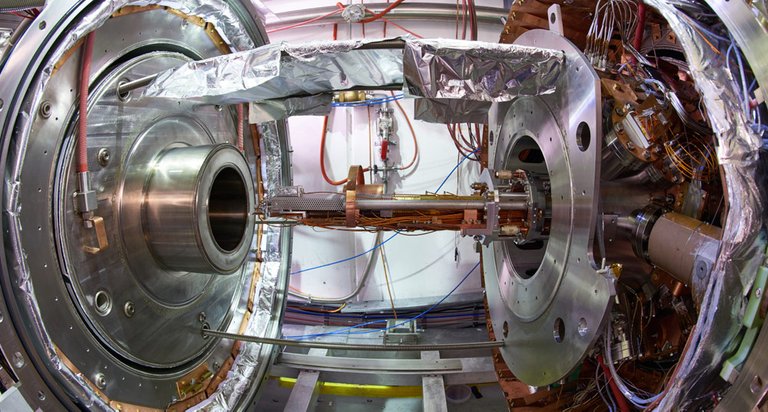
The Antihydrogen Trap | AEgIS
However, making experiments with antiobjects is really hard, and at present near to impossible. The research on antiparticles is still at the infancy phase. Only recently, scientists have succeeded in creating antihydrogen using antiprotons and antielectrons. In 2010 scientists at Switzerland-based European Organization for Nuclear Research (CERN) succeeded in creating a few hundred atoms of it and trapping them for about twenty minutes. Looks quite impressive, doesn't it? But it is not enough to answer all the big questions about antimatter. Imagine how little we could have learnt about the universe if we were allowed only to see a small number of hydrogen atoms for a few minutes.
Although we are making good progress in antimatter research, yet we won’t learn much unless we develop better techniques to create larger number of antiparticles and also develop methods for storing them safely. The scientists at CERN have, however, developed a method to store antiparticle safely at least for a few minutes.
When the particle scientists at CERN generate antihydrogen atoms, which are electrically neutral (unlike positron and antielectron which can be controlled by electric field) they take advantage of the magnetic properties of antihydrogen. They used to superconducting magnets to generate a strong magnetic field to control and trap antihydrogen atoms. If the antihydrogen atoms have low enough energy, they can stay in this magnetic "bathtub" for a longer time.
At present, only a few picograms of antimatter are created annually at CERN, which means that it would take millions of years to make antimatter equivalent to half a raisin!
Little More About Antimatter and Anti-gravity
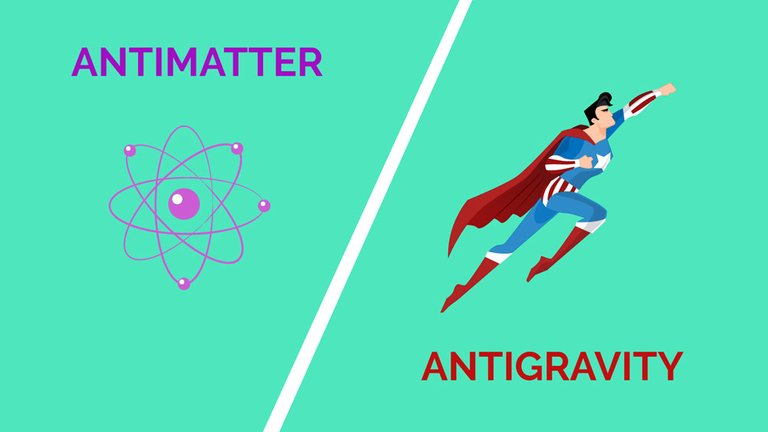
So far we know that antimatter exist and have an opposite charge compared to its regular counterpart and that when it comes in contact with matter, they annihilate and turn into light.
However, there are a lot many questions about antimatter that are still unanswered. On the first hand we don't know why antimatter exist at all? And again we know that the universe definitely have some preference for matter over antimatter. But why is it so? We don't know. These questions may give you a headache and may make you wary of antimatter. But think about the awesome features of antimatter. This argument may give your mind some refreshment:
"The Feynman - Stueckelberg interpretation states that antimatter and antiparticles are regular particles travelling backwards in time." (Wikipedia)
Wait, hold on your excitement, read the sentence again. It is just an interpretation of the behavior of antiparticles, not that they are actually travelling backwards in time.
Well, there is one more amazing question about antimatter: Do antiparticles feel gravity the same way as matter particles do?
Although we know many things about antimatter and our current theory predicts that it feels gravity just like normal matter*, yet we cannot actually observe it because we don't have enough quantity of antimatter to experimentally test it. Gravity is such a weak force (and you know it depends on mass) that we need a very large number of particles to measure it. And again antimatter is so rare and unstable that accurate gravitational experiments are nearly impossible.
Nevertheless, in 2013 CERN's anti-atom factory, ALPHA carried out the gravitational experiments on the few antihydrogen atoms which they trapped using magnetic fields. They tried to observe the behavior of the anti-atoms when they were released from the magnetic trap. In that condition, the antihydrogen atoms were experiencing no other force except gravity. And there were detectors to detect the movement of antihydrogen atoms, to check whether they rise up or fall down under the effect of gravity.
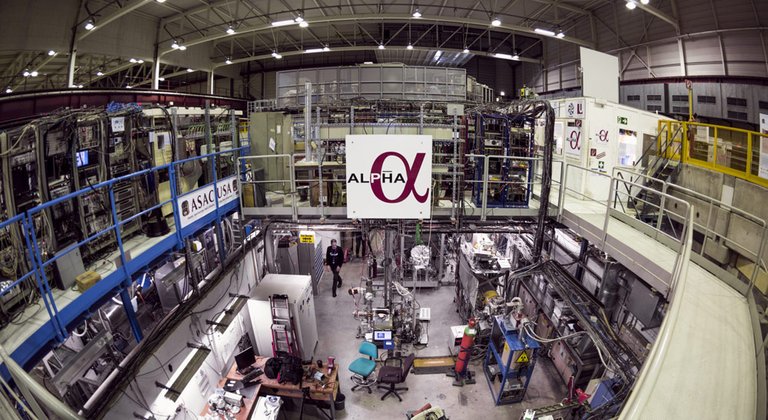
ALPHA
The experiment also tried to determine whether the effect of gravity on the antimatter was equivalent to that of matter. It tried to determine the effect using the ratio of the antihydrogen's gravitational mass Mg to its inertial mass Mi (its resistance to change of motion under a force). And the weak equivalent principle states that inertial mass should be equal to gravitational mass and it has been tested to high precision for matter. If the weak equivalence principle holds (i.e. gravitational effects is similar to that of matter) then the ratio F=Mg/Mi must be equal to 1. And if antimatter experiences the opposite i.e. anti-gravity, then F should be equal to -1.
But the results of the ALPHA experiment didn't even come close to that. The experiment concluded that the ratio was probably no more than 110 or less than -75 (i.e. -75 < F < 110). So we cannot conclusively say that antimatter experiences anti-gravity or not. (Thanks @lemouth for explaining this to me.)
However, CERN is also working on a new experiment named GBAR, which stands for ‘Gravitational Behavior of Antihydrogen at Rest’. The setup of components of this project is still not complete, which is expected to be completed by September 2018. This experiment can provide some more accurate data on the gravitational property of antimatter. You can learn more about the GBAR project in @lemouth's post: Live from CERN - What does antimatter say when it falls?.
But what if antimatter feels gravity differently from the regular matter? Remember the defining feature of antiparticles, that their electromagnetic, weak and strong force charges are reversed. Is it possible that antiparticles also have their "gravity charge" reversed? And if that happens then antiparticles would feel gravity the opposite way. Imagine if we somehow figure out how to create and harness the antigravity property of these antimaterials, then those flying cars and antigravity boots we fantasized about in our childhood days might actually become a reality!
* Remember Einstein's theory which suggests that the fabric of time and space bends due to the effect of mass. It will require negative mass for antiparticles to have antigravity. Which is not possible (Or is it?).
Image Source :
All the non cited images are either taken from Pixabay.com, Pexels.com, or Wikipedia.com and are available for Reuse under Creative Commons Licenses or created by me.
References
- https://en.wikipedia.org/wiki/Antimatter
- https://home.cern/about/engineering/storing-antimatter
- https://arstechnica.com/science/2013/04/does-antimatter-fall-up-experiment-could-provide-the-answer/
- Jorge Cham and Daniel Whiteson (2017) : We Have No Idea
- Other various references are inside the post
Previous Episodes of the Series
- Simple Question #1 - Why do we Dream? What is its purpose?
- Simple Question #2 - What is Life? Why does it exist at all?
- Simple Question #3 - How big is the Universe? What is its Shape?
- Simple Question #4 - Should we eat Meat? Why and Why Not?
- Simple Question #5 - What is Time? Will it ever stop or reverse?
- Simple Question #6 - Do we all feel Time the same way? Can we travel back in Time?
- Simple Question #7 - What is Space? Is It Really a Static Infinite Void?
- Simple Question #8 - Does Space have any overall Shape? Is it Quantized?
- Simple Question #9 - How Animals See the World? Do They Experience the Same World?
- Simple Question #10 - What Will Happen if You Touch Antimatter? What Actually is Antimatter?

For more discussion on this topic (or anything related to science), please join us on steemSTEM. SteemSTEM is a community driven project which seeks to promote well written/informative Science Technology Engineering and Mathematics postings on Steemit. More information can be found on the @steemstem blog.
Follow me @nitesh9



--- thinknitesh.com ---
Very nice post nitesh! Just one comment concerning concerning the neutrinos. Their Majorana or Dirac nature (the fact that they are their own antiparticle or not) is really one of the big questions particle phycisists are after today. No one knows so far, but hopefully we will have more data in the coming years. In the simplest models explaining neutrino masses, they are often their own antiparticles.
Thank you so much @lemouth. You helped me a lot in this antimatter post especially the gravitational property part. :)
Yeah, hopefully one day we will be able to tell the exact nature and property of the mysterious neutrinos. :D
But this song says I am a ray of sunshine through the dark clouds. Are you telling me they're lying to me?!
I think you show really well how tricky anti-matter is, almost mystical. I think it's more probable that anti-matter doesn't exist, given how reactive it is with regular matter. So Einstein's theory could be the right one. Unless something much weirder is going on.
And bravo for them imgs you made! Wish I could illustrate as well as you!
Ha ha! Maybe. :p
And thanks for your awesome comment. :)
I'm really in love with this post. Due to the fact that all terms mentioned there are all known to me. Having read one of Dan brown's book titled angels and demons. It was a really good book explain some minor aspect of this question. It'd be interesting if you check it out @nitesh9
Thanks @donaldpete. Yeah, I have heard about the Dan Brown's, and will definitely have a look. :)
I'd be thrilled to see the antimatter version of myself! Would it be like that black, evil version of Spider-man?
I like the idea of anti-gravity. Let's wish the CERN guys luck in finding out if antimatter antigravitates :-P I'd really like to have flying boots in 40 years...
Yeah, same here. Really excited to see the final results of the antimatter antigravity experiment. :D
It's so interesting, but even after studying lot's of physics I find it hard to grasp on.
I mean in theory it sound great, but how can you know something exist when you can't measure it of proof it's existence?
I'm sure in a few year (hopefully not long) we all will lough of such question, as enough experiments will prove it, but what if we will find proof that will completely trash it all?
First we speculate from what we observe, the we do experiments to check our speculations. Yeah, sometimes it may show variance from what we thought. And that will be a game changer. :p
Thanks for reading. :)
Wish I will be there to see it!
Entire precursor group of galaxies should be all made of antimatter as well. A single galaxy can't have antimatter stars because of the way the whole galaxy as well as individual stars form through the accretion of gas. If any portion of that were antimatter, it would meet and annihilate with normal matter very early in history.
However, seeing as how just after the Big Bang the universe was rather homogeneous, the whole matter-antimatter imbalance was resolved by annihilation very early in the universe, and thus it is nearly impossible for any significant lump of antimatter to be left after this early process.
That means you support the Possibility #1. Thanks for your valuable comment. :)
Wow! Reading your article made me think about more and more questions. Physics, at least for me, represent something that is quite difficult to imagine or fathom, but I like how you explained stuff in understandable manner. The idea of antigravity sounds great haha, flying would be cool. Anyway I also appericate the usage of sources and various links, enjoyed reading with my morning cup of coffee. :)
Thanks for such a wonderful comment and appreciation. :)
Really motivates me to bring the best I can.
What are the biggest practical implications of this, Nitesh?
Yeah, it has. Read the whole post you'll know.
Also don't forget to read the previous part, Simple Question #10.
Antimatter can solve our energy problems cuz annihilation releases humongous amount of energy. There are also many other benefits of antimatter and above all to quench our curiosity. ;)
My cordial opinion is that it is very likely that there is a universe of antimatter and it would be interesting to see what its form would be or if it is very different from ours.
I enjoyed reading this. It is a really interesting question to ask. And it will be amazing to follow discovery in the near future. My teacher believed in the first possibility. I am actually not sure which possibility makes more sense I guess I would go with the third option and we will see if there is any hidden antimatter.
Yeah, only future discoveries can tell what exactly happened to antimatter. :)
Yes and that is why I am so into science.
I like this question series entrance!
Thanks. :)
Great post! It's such a strange thought that we know so little (or are so unsure) of the universe we live in, despite having come so far over the last millennia!
Yeah, this universe is so vast and mysterious that we cannot know all its properties even after 100 yrs. :D
Thanks for the appreciation. :)
I guess we will get to know more in the coming years. For now, all this is a little too much for me to ponder about:)
Off to my own blog to write some horror fiction :P
Yeah, we are constantly developing new techniques to go deeper into the laws of the universe. Hope one day we will....Thanks. :)
Your posts are very interesting. I have started to follow you and reading your posts one by one. :) Good work mate.
Thanks bro. :)
Incredibly interesting post, enjoyed every word of it. And it looks like I've missed ten other 'simple' questions, so I've got a whole lot of catching up to do! By the way, I regularly write stuff in the steemSTEM category as well, is that steemSTEM GIF at the end of the article free to use for everyone?
Thanks for the appreciation.
Yeah, you can use the steemstem gif freely. If you like you can give me a little credit for that. :D
Here you can find some more SteemStem GIFs: https://steemit.com/dtube/@nitesh9/amir0m2x
Good post, I am a photographer, it passes for my blog and sees my content, I hope that it should be of your taste, you have my vote :D greetings
Thanks. :)